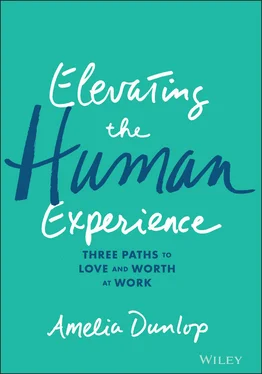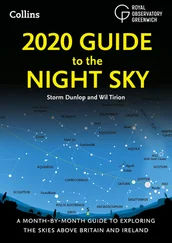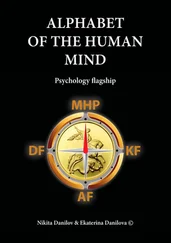I have worked as a management consultant now for 23 years. I made partner at age 35, the same day my third child was born in the front seat of our family car. Each of my children is a lifetime of meaning to me. I returned to work six months after each child was born, knowing that I was forever changed. My colleagues still saw me as Amelia, the project leader, the senior manager, and eventually the partner, but inside I was this new person I needed to get to know: I was my children's mother. I struggled to know how to integrate the dichotomies of this newly found self. At work I was ordered, efficient, and hard driving. At home I was messy with breast milk, chronically sleep deprived, and doing my best to love and nourish my children. I was always either a management consultant or Mama. I was never just a woman named Amelia, worthy of love whether at home or at work. Moreover, I felt like the things that made me, including my womanhood and motherhood, were not worthy of the predominantly male culture I found in my industry. And my work self was irrelevant at home with my children. I checked personal Amelia at the door going into work. And I checked professional Amelia at the door when I came home.
I had three degrees, three beautiful children, a loving husband, a fulfilling career, and yet at times I still did not feel worthy of love. External gold stars no longer shined long enough to make me feel worthy. And the more time I spent at work, the more time I felt as though my loving, worthy, female self was not fully welcome. Too often, I was the “only” woman in the room, in the meeting, or at the table, which I could take at first as a sign of my success, but over time it only reminded me of what was missing. As a former boss, Sandi Pocharski, shared with me, “Being the ‘only’ feels like a prize, until it doesn't.” She is the only female boss I have ever had.
I am not a professor of sociology, theology, or psychology. I am not a leadership coach. I do not work in the field of human resources or organizational psychology. I am by no means a scholar in the fields of gender equity or anti-racism. There are many whose teachings in these fields I admire and refer to throughout this book. I am, however, a devoted wife, a mother of three, and a White woman who runs a multi-hundred-million-dollar national business focused on strategy and human-centered design. And I love my work. I have the enormous privilege of working with bright, motivated, and articulate colleagues, some older than I am, but most now younger in a field where we are well paid for our hard work, opinions, and judgment. We are lucky, perhaps at times too lucky, even to see the privilege we now share. It is an economic privilege first and foremost, but it is also the privilege to be in the type of work that can provide us not just with a paycheck to cover our family's needs, but with the possibility of love and worth.
I am aware that much of work is the drudgery of punching a time clock, as I know from personal experience working jobs that required my physical labor as much as my time. Work is also the paycheck-to-paycheck livelihood of supporting a family on minimum wage. Even more of work is the unacknowledged and unpaid labor of caring for our children, our sick, and our elderly. And work itself is changing. How we organize the tasks of work, how the workplace is configured, and who we consider to be a worker are all in flux.
When I sometimes catch myself thinking, “Work is just work,” I recall John F. Kennedy's first visit to NASA in 1961. While on a tour of the facility, he was introduced to a janitor mopping the floor. Kennedy asked him what he did at NASA, to which the janitor famously replied, “I am putting a man on the moon!” This man understood that his job, his role, mattered in the grand aspiration of space travel. I think of him whenever I catch myself thinking that the aspiration to elevate the human experience is too lofty. The janitor had enough self-love to recognize his own worth. Kennedy mirrored back his worth. And together they were part of the larger enterprise in NASA and in the United States to work together towards something that elevated the human experience beyond the known boundaries of earth. If Kennedy and that janitor from NASA can aspire to put a human on the moon, I believe we can aspire to make the experience of being right here on earth at work just a little bit better, a little bit more human.
Work is foundational to our being: it is in the doing of daily tasks that we create ourselves and the world around us. We create the safety and security that we need to thrive. We are like the Greek god Eros, who is depicted as one of the primordial gods in charge of creating the cosmos. As soon as we can pinch forefinger and thumb together as babies, we are placing blocks into buildings, stirring wooden vegetables with wooden spoons in pots and pans. We build, we make, we sing, we dance. All of this is work—exertion or effort directed to produce or accomplish something. We grow and our work evolves from play to productivity and profit. We push stones and bricks instead of blocks together. We care. We count. We heal. We tap plastic keys to form words to express ideas. All work. The Protestant work ethic created the connection between how hard we work and how well we live out our values. Descartes at the end of his extended exploration for something that could not be doubted concluded, “I think, therefore I am.” At its most basic level, thinking that cannot be doubted is work.
Since Adam and Eve were tossed out of the Garden of Eden, work has been central to the human experience. In Elizabeth Lesser's Cassandra Speaks , she retells the story of Adam and Eve as a journey of self-actualization, self-knowledge, and wisdom, not the “fall from grace” it is often depicted as. Our biblical ancestors went from a childlike state, Lesser argues, where all was provided for them, to one in which they provided for themselves through the fruits of their own labor. Work, it seems, is inevitable and unavoidable, defining us and shaping us on our journey from childhood to adulthood.
We call it work precisely because exertion is required. Work is defined by the presence of mental or physical exertion and is often about achieving some desired outcome. There are obstacles to be met, frustrations faced, and failures to be had. It takes work, as my 15-year-old son can tell you, sometimes just to pull the covers back and get out of bed. It takes work, as my 13-year-old son who has dyslexia knows, even to read these words on this page. It would be easier to do nothing, to ignore the needs of the body, of the bodies who depend on you, than to do the heroic task of exerting effort against inertia and leaving the garden.
The Five Distortions of Work
The Buddhists teach of “right livelihood,” which is the belief that work enhances our well-being and strengthens our capacity to love. And yet work that is meant to make us into who we are, enhancing our capacity to love, can become twisted and distorted. Through my experience and in my research, I believe that work can become distorted in five ways: 1) through anomie and alienation, where workers become automatons instead of whole humans; 2) when one part, IQ, is prized over our whole, which includes our emotional intelligence or EQ; 3) through our hierarchies, where one group of people is subordinated to another; 4) when we overwork, and work consumes the space where rest and leisure belong; and 5) when the exchange of labor for pay is inequitable and does not recognize the value of the human performing the work.
Work becomes distorted when we separate our humanity from our labor.Things that would be unacceptable in the personal sphere we accept and normalize in the professional sphere. In the corporate workplace names are replaced with personnel numbers, seeing humans as nothing more than “full-time equivalents,” or FTEs for short. Workspaces are turned into cubical farms. Efficient transactions are rewarded over authentic relationships. Perhaps that is why 40% of us feel the need to check parts of our identity when we cross the threshold of work. We hide our personal self behind our professional self, just like I hid myself and my feelings up in that tree in my grandmother's garden.
Читать дальше












